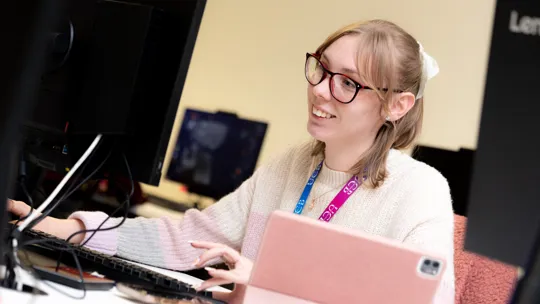January 2025
Artificial intelligence could revolutionise higher education, according to lecturer research
By Melanie Hall
Share post:Read time: approx 4 mins
Artificial intelligence could revolutionise higher education and improve the student experience at universities, but it still has limitations, according to a marketing expert at University College Birmingham.
Lecturer Rohim Mohammed spoke to Times Higher Education about how AI could be used to support, not replace, lecturers following the government’s unveiling of an ambitious AI action plan for UK growth on Monday.
The AI Opportunities Action Plan, which includes incorporating AI into education, is backed by leading tech firms, some of which have committed £14bn towards various projects.
Rohim, who leads on digital modules on courses within University College Birmingham’s Business School, said clear advantages of AI in education included time-saving, consistency, objectivity and enhanced feedback quality, while it could also help alleviate stress and burn out in educators.
By automating repetitive tasks, more time could be spent on teaching and mentoring students, improving the overall learning experience.
However, Rohim said there were concerns and challenges.
“It has the potential to improve speed, consistency and detail in feedback for educators grading students’ assignments,” he told the Times. “The question is, does it risk compromising the human element central to learning. Perhaps there is a middle ground, where AI could act as a lecturer’s assistant rather than a replacement?”

Lecturer and AI in education expert Rohim Mohammed
Putting theory to the test, Rohim conducted his own experiment into whether AI could reliably and independently grade assignments. Uploading his own assessment rubric to ChatGPT-4 and comparing the AI tool’s grading with his own, the AI over-scored by as much as 20 per cent.
“This gap highlighted current limitations, but it also revealed a valuable opportunity,” he said. “Whether AI could be trained to better align with human judgement. Through iterative learning, I guided the AI to reflect on its grading in comparison with mine. Over time, this process produced grades that more closely matched.
“However, the AI frequently exhibited “hallucinations”, fabricating details and incorrectly commenting on elements of student work. There is more work to do here.”
Read more about Rohim’s research into AI in education.
*A former digital marketing trainer for West Midlands Combined Authority, Rohim is instrumental in reshaping learning using the latest technology at the University. He also prepares both individuals and businesses for a future enhanced by AI as an external consultant. Find out more.
Incorporating AI into the curriculum
We incorporate AI in many ways at University College Birmingham. For example, we recently hosted a conference on the transformational potential of AI in a variety of real-world applications. Business students had the opportunity to engage with expert guest speakers who demonstrated the usefulness of AI in areas as diverse as healthcare, safety, rail transport, sustainability, and unemployment support. We also incorporate AI into courses, including using virtual reality in areas such as nursing and events.
Check out our latest news stories

Former RACA chef apprentice wows Alpine resort guests alongside MasterChef winner
A former Royal Academy of Culinary Arts (RACA) apprentice worked with MasterChef winner and ex-student Dan Le…
Read more
Students help revitalise Great Malvern visitor strategy for the next generation
Six students are working with Malvern Hills District Council to deliver a new tourism and hospitality project.
Read more
Sixth formers explore Singapore's sustainability on trip of lifetime
Twenty sixth formers from University College Birmingham explored Singapore's groundbreaking work in sustainability on an e…
Read more
University in running for top regional sustainability excellence award
University College Birmingham has been shortlisted for a Midlands Sustainability Excellence Award.
Read more
Sun, sights and sustainability for students on Montenegro trip
The trip gave students an insight into sustainable tourism in this up and coming destination.
Read more
Blog | Our 7 top tips for exam preparation
Exams just around the corner? Feeling anxious, or like you’re not sure how to prepare? Don’t worry! Our top tips will help you navigate this stressf…
Read more